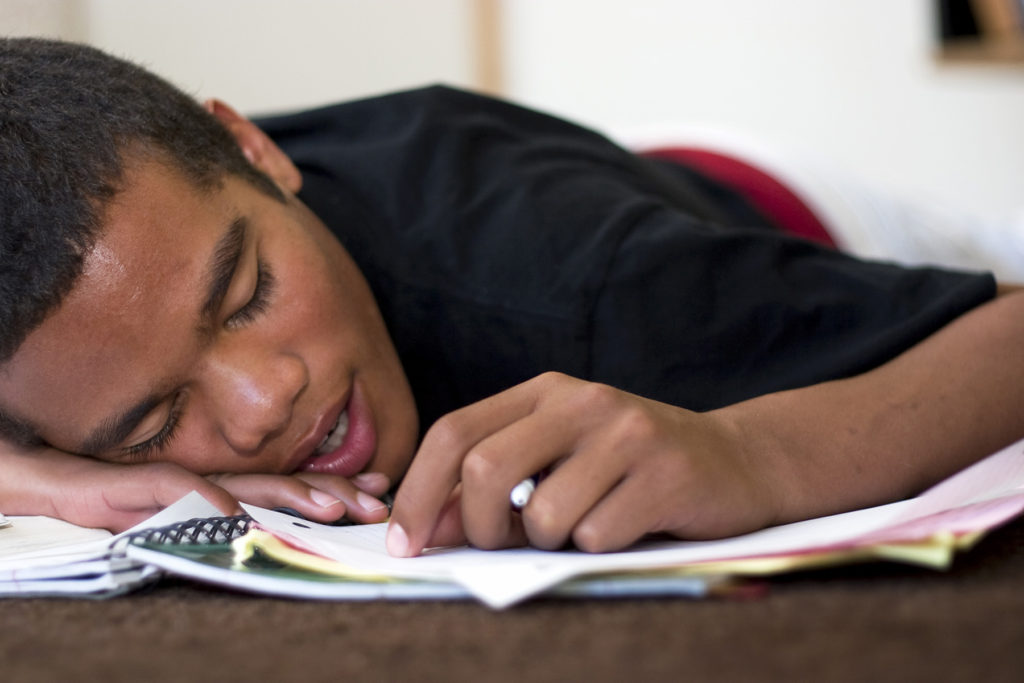Importance of Healthy Sleep for School Success

Why Healthy Sleep is Important For School Success
Not only is sleep critical in the functioning of all body systems, scientists have found a distinct correlation between our ability to learn and process memories, and our sleeping habits. Studies show too little sleep can contribute to many physical and mental health issues, including poor ability to learn, depression, high blood pressure and disease.
For many parents, ensuring their children get the right amount of sleep can be stressful. Below are some facts on why it’s so important that our students get the shut-eye they need, and how you can help them get into good habits.
How Does Sleep Affect Learning?
For all of us, memory and learning are consolidated during sleep. For adolescents, this mostly happens during REM sleep – which is a phase in the sleep cycle that happens after deep sleep. During high-pressure times such as exams, students are often tempted to pull all-nighters to cram for the next day. Unfortunately, this is often counterproductive – because with fewer hours to reach the REM phase, the teen brain doesn’t get enough time to lay down what they’ve studied the night before. While the old advice is that it’s important to get a good night’s sleep before an exam the real benefits occur when teens get a good night’s sleep after studying for the exam.
In her groundbreaking book The Teenage Brain, neuroscientist Dr Frances Jensen explains ‘Bedtime isn’t simply a way for the body to relax and recoup after a hard day working, studying or playing. It’s the glue that allows us not only to recollect our experiences but also to remember everything we’ve learned that day.” Not only does sleep strengthen learning and memories – it also has the ability to prioritize memories by breaking them up and organizing them according to their emotional importance. Essentially the more you learn, the more you need to sleep which is why a good sleep is critical in achieving success at school.
How Much Sleep DoWe Need?
While there is no magic number for exactly how much sleep we need, the Australian Center for Education in Sleep (ACES) suggests the following as a guide:
- Primary School: 10-12 hours per day
- High School Teens: 8-10 hours per day
- College Age & Adults: 7-9 hours per day
During our students teen years, and even into their initial college years, melatonin (a sleep hormone) is released later in the evening compared to adults, which explains why they may fight sleep in the later evening. Because of the delayed release of this hormone, it also sticks around longer, making them sluggish in the morning. A healthy sleep routine with adequate time to wind-down at the end of the day is important to ensure your teen gets the sleep their brain needs to develop and consolidate everything they’ve learnt that day.
What Happens If They Don’t Get Enough Sleep?
According to the ACES, 35 – 40% of children and teens experience some form of sleep deprivation during their development. A short-lived bout of lack of sleep is generally nothing to worry about: the bigger concern is sleep deprivation – a longer period of time where you are not getting the hours you need to function and learn.
Poor sleep will have all sorts of adverse physiological, emotional and cognitive effects on children and particular teenagers, including:
- Susceptibility to serious illness
- Rise in blood pressure
- Eating too much, or eating the wrong foods
- Mood swings
- Aggressive, impatient behavior
- Low self-esteem
Without adequate sleep our focus and attention drifts making it harder to receive information. When we are sleep-deprived our overworked neurons can no longer function to coordinate information properly and we lose our ability to access previously learned information.
So, How Can Parents Help?
If you think your child needs more sleep, try making gradual changes to their sleeping habits, or encourage changes in sleep habits for your college age children. Small increments have been shown to be effective in changing sleep patterns. Here are a few more tips:
- Be aware of the signs of fatigue in your children and speak to them if you’re worried they are sleep deprived.
- Be clear about how much time is productive for your kids to spend on their computers and phones, apart from school work – a limit of no more than one to two hours a day is ideal.
- The light from LED screens delays the release of melatonin and makes it difficult for the brain to wind down. Encourage a no screen policy one hour before bedtime if they find themselves fighting sleep.
- Try to limit soft drinks, fried food, sweets and caffeine (even tea) before bed.
- Regular exercise will help tire their bodies and get them ready for sleep.
Remember, whether you have younger children, teens, or college age children, they are going through a period of their lives where their brains and bodies are going through a lot of change. Not only is your job to set these firm guidelines and support them along the way when they are young, it is also important you encourage them as your children get older and even into their college years. It’s also important to be patient and ride the wave with them. It may not be easy, but they will thank you for it (eventually!).
This article is for informational purposes and should not replace advice from your doctor or other medical professional.
(Excerpted from: Studiosity Blog – Written by: Sophia Gardner; April 11, 2016)
This blog provides general information about sleep and sleep products. The words and other content provided in this blog, and in any linked materials, are not intended to replace a one-on-one relationship with a qualified heath care professional. This blog should not be construed as medical advice or used to diagnose, treat, prevent or cure any disease or condition. If the reader or any other person has a medical concern, he or she should consult with an appropriately-licensed physician or other health care professional. This blog is not a substitute for professional medical advice, diagnosis or treatment, and should not be relied upon to make decisions about your health or the health of others. Never disregard professional medical advice or delay in seeking it because of something you have read on this blog or elsewhere on bettersleep.org. If you think you may have a medical emergency, immediately call your doctor or dial 911.

